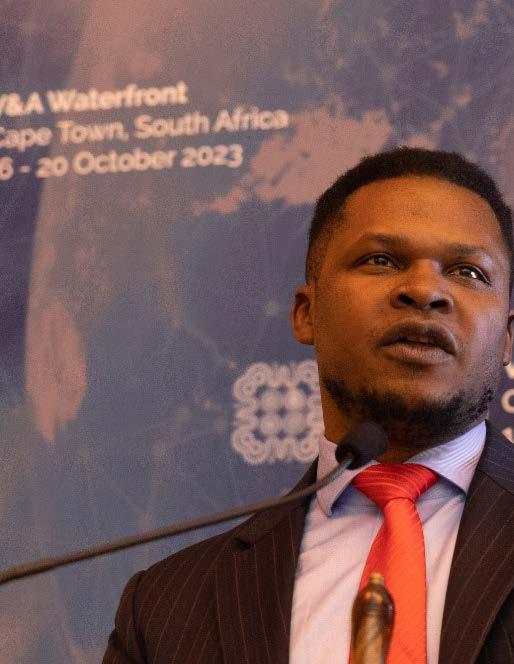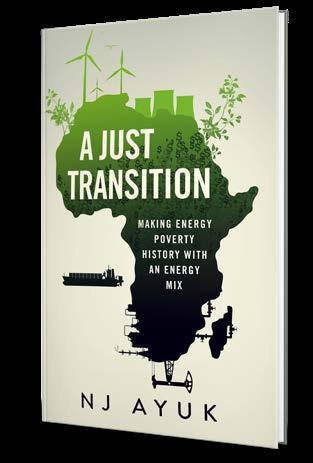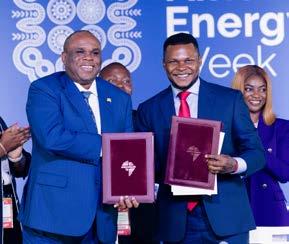
1 minute read
ENERGETIC & ELECTRIC NJ AYUK
NJ Ayuk is the Executive Chairman of the African Energy Chamber, CEO of pan-African corporate law conglomerate Centurion Law Group, and the author of Amazon bestselling book “ A Just Transition: Making Energy Poverty History With An Energy Mix ”, “ Big Barrels ” as well as Amazon and Wall Street Journal’s bestselling “ Billions at Play: The Future of African Energy and Doing Deals ”.
Q: HOW DO YOU MANAGE TO JUGGLE BEING AN EXECUTIVE CHAIRMAN, A CEO, AND AN AMAZON BESTSELLING AUTHOR ALL AT ONCE?
I lived, studied, and worked in the U.S. and the things that stood out to me when living there were the American sense of optimism, personal responsibility, and a strong work ethic. I bring all of that to my work. Even now, during these troubled days, that mindset is still there. Living in America offers unique opportunities; people can start with very little, work hard, and make a better life for themselves for their children, and the generations that follow.
Achieving those things— the American Dream—doesn’t happen for everyone. But it does happen enough to make it more than a myth or fantasy. I saw it with my own eyes. So, can Africans aspire towards the same things? Can we achieve an equally powerful African dream? A dream of stability and prosperity? My answer is a resounding yes! As the Executive Chairman of the AEC, I want to ensure that this happens to Africans, and I must find the time to write and tell an African story.

Q: YOUR LATEST BOOK RELEASE, A JUST TRANSITION: MAKING ENERGY POVERTY HISTORY WITH AN ENERGY MIX, SAYS A LOT. HOWEVER, THERE ARE COUNTRIES THAT HAVE SWITCHED TO GREEN ENERGY AND ARE STRUGGLING. DOES YOUR NEW RELEASE DISCUSS THIS ISSUE?
Europe is returning to coal because they transitioned to green energy in a reckless fashion. 600 million Africans
Yes, I know that renewable energy can help meet Africa’s power needs, too. But Africans shouldn’t be pressured to make either-or decisions in this area. The green transition must be made strategically and soundly, carefully considering the needs of the African people. Keep in mind that hundreds of millions of Africans have insufficient access to electricity in the current configuration, with hydrocarbons still in the mix. Take away what little availability they have to fossil fuels, and they will — quite literally — be left in the dark.
Telling Africa not to develop its resources is akin to making Africa “pay for the sins” of other regions. I say, trying to dictate what Africa does with its own resources is insulting, hypocritical, and frankly, an overstep.
Q: WHAT ARE THREE MAIN POINTS THAT YOU WOULD LIKE READERS TO CONSIDER FROM READING YOUR NEW RELEASE?
Energy poverty and climate change are two sides of the same coin. Africa has the need to industrialise, and it is not going to done by renewables alone. We need baseload energy. Free markets and limited government are key to
Africa’s growth not foreign aid and handouts. How are we going to drive a Tesla if we have no electricity?

Q: WHY DOES YOUR BOOK MOSTLY HIGHLIGHT THAT OF AFRICA’S ENERGY MOSTLY INSTEAD OF EXPLORING SOMETHING THAT COULD BENEFIT THE WORLD, WORLDWIDE? YOUR FOCUS POINTS ARE ON AFRICA AND EUROPE AS STATED IN A PRESS RELEASE.
The energy transition is unjust to poor Africans; their voices must be heard. African energy poverty is critical and has not been put on the global stage. Greenhouse gas emissions are lowest in Africa; the continent needs to industrialise and the wealthy nations need to decarbonise.
What’s behind the vested interest in African natural gas production? Does the world really have our best interests at heart? Sure, reining in greenhouse gas emissions is an admirable goal. But consider this. Over the last 300 years, all of Africa has emitted seven times less carbon dioxide than China, 13 times less than the United States, and 18 times less than the combined countries of Europe. Attempting to phase out Africa’s oil and natural industry to prevent climate change is like snuffing out a small, controlled campfire instead of focusing your attention on kilometres of blazing forestland.
It is funny that the keep-fossil-fuels-in-the-ground argument is a Western construct promoted by countries that developed their economies with fossil fuels.
Q: WHAT IS YOUR ADVICE TO LEADERS WORLDWIDE THAT THEY CAN DO TO MAKE CHANGES ON ENERGY FOR THEIR OWN COUNTRIES?
My message to world leaders is that we need to have a engage in energy issues with pragmatism and common sense. The polarisation and demonisation of natural
gas hurts poor people. We need to look at Africa differently because Africa is more than capable of building a better future for itself, strengthening its economy, and improving the lives of everyday Africans by beating energy poverty.
Who is going to do it, if not us? Ourselves. It’s not going to be done by foreign aid and handouts. Africa needs a hand up. And really, nobody besides us can truly make Africa the place we want it to be.
To African leaders and the cleaver global intelligentsia that are clamouring for aid and handouts, Africa’s future is our responsibility. So, what is holding us back? Ourselves. If we want to see widespread change for the better, we need to stop dwelling on our obstacles or blaming people, governments, or circumstances for our difficulties. If we want to make things better, then we need to be the ones to make it happen. We need to find unique solutions for our unique challenges and work as long and hard as necessary to make our strategies successful.
Essentially, we need to pull ourselves up by our bootstraps. I’ve shared those ideas in the past, and in this book and some people don’t like them especially the elitist Africans and wealthy and privileged westerners.
They tell me I’m failing to consider Africa’s history of colonialization and oppression and the corrupt government systems we have in Africa, the poverty, lack of infrastructure, and many dangers that are everyday realities for many. My response to that is, I’m not, for a minute, diminishing Africa’s painful history or dismissing the problems the continent faces today. I just wonder, how long are we going to use our hardships as excuses not to move forward?
Because if we can agree we want more and commit to doing the really hard work that it takes to get it, we can make transformational changes in Africa and beat energy poverty.
Your regular exposure to indoor air pollution increases your risk of respiratory infections and chronic conditions. If you need to go to the hospital for treatment, it will be by lantern light or, worse yet, in the dark. Equipment that requires electricity, like MRI machines and ventilators, is probably not an option. And that’s just one aspect of your life. It doesn’t even touch on how a lack of electricity impacts your children’s school or limits economic growth in your community and your employment opportunities.
Gas-to-power technology which, incidentally, generate fewer CO2 emissions can bring reliable electricity to Africa. But we must be allowed to unleash our resources, not constrain them. The good news is thirteen African countries are using natural gas they produce themselves or import from neighbouring nations to generate electricity.

Q: YOUR BOOK MENTIONS THE REALITIES OF ENERGY POVERTY IN AFRICA. CAN YOU SHARE WITH US, READERS, WHAT THOSE ARE?
The most important reason why Africa should be free to continue hydrocarbon production is this, Africa’s huge natural gas reserves are the continent’s best shot at alleviating energy poverty. Today, more than 620 million people in sub-Saharan Africa don’t have electricity. That’s two-thirds of the population.
Hundreds of millions more have unreliable or limited power. What does that look like? Without electricity, you’re cooking your food and warming your home by burning wood, charcoal, or maybe even animal waste.
Your regular exposure to indoor air pollution increases your risk of respiratory infections and chronic conditions. If you need to go to the hospital for treatment, it will be by lantern light or, worse yet, in the dark. Equipment that requires electricity, like MRI machines and ventilators, is probably not an option. And that’s just one aspect of your life. It doesn’t even touch on how a lack of electricity impacts your children’s school or limits economic growth in your community and your employment opportunities.
Gas-to-power technology which, incidentally, generate fewer CO2 emissions can bring reliable electricity to Africa. But we must be allowed to unleash our resources, not constrain them. The good news is thirteen African countries are using natural gas they produce themselves or import from neighbouring nations to generate electricity.
Q: HOW DOES ARTIFICIAL INTELLIGENCE COME TO PLAY AN IMPORTANT PART IN HELPING THE ENERGY TECHNOLOGY IN AFRICA? WHAT TYPES OF ARTIFICIAL TECHNOLOGY DOES YOUR BOOK MENTION?
Over the last two decades, the world has entered a new stage of digitalization. Some have gone so far as to call it the Fourth Industrial Revolution. In this new stage, technology isn’t just a means to an end; it can also be a part of the decision-making process.
Every African country and every African company involved in energy projects ought to embrace AI technologies. Yes, I mean every single country and every single company. Yes, even if they were originally meant to benefit non-African users working in non-African environments. Yes, even if they were designed to operate in places where energy markets and infrastructure are, on average, more developed than they are in Africa. Yes, absolutely!
Why? Because the existence of these technologies and tools gives Africa the chance to engage in another bout of leapfrogging. If African stakeholders follow this path, they’ll have opportunities to save time and money. They’ll be able to do more than just develop their own hydrocarbon resources, expand their own electricity production, and support their own local electricity and fuel markets. They’ll be able to adopt and integrate new technologies as they do all these things. They’ll be able to explore every option for making the African energy sector as efficient and productive as possible.

Q: DOES ADVANCED TECHNOLOGY REPLACE JOBS THAT HUMANS COULD DO THAT WOULD HELP THE ECONOMY?
No, they do not. However, we need to embrace technology and upskill our people for the future. I want Africa to use all the innovations and inventions that are available now, even if they weren’t available in Africa first. I want Africa to seize this opportunity, as it has done with mobile telephones. So, let’s skip as many intermediate stages of development as we can. Let’s set milestones for new technologies as we pursue our goals for energy.
Q: CAN YOU TELL US ABOUT YOUR OTHER BOOKS, BILLIONS AT PLAY AND BIG BARRELS?
In both books I set out to have a discussion and solutions for Africa’s Oil and Gas industry. Africa’s oil and gas resources have been associated with a “resource curse” but if African countries harness them strategically, they can create a better future for everyday Africans. The books deal with the role of women in our energy sector. Women continue to make up small percentage of energy industry workforce. There are even fewer women in energy industry leadership roles and that’s very disappointing. We need to encourage women in management and leadership positions in Africa’s energy industries
Q: HOW URGENT IS THE ENERGY CRISIS IN AFRICA?
Energy poverty is a serious concern. Making the solution more difficult to address is simply wrong. You are going to see potential civil wars and coups in many countries if we don’t deal with our energy crisis and that will be a setback for democratic gains, social advancement, and good governance.
Q: WHAT OTHER PROJECTS ARE YOU CURRENTLY WORKING ON AT THE MOMENT?
I am currently negotiating a deal to produce a documentary about Africa’s energy transition, climate change and energy poverty. I am launching a podcast on energy issues and Africa soon so watch this space!
Q: WHERE CAN READERS FIND YOU AND YOUR BOOKS ONLINE?
This book can be found on Barnes and Noble, Amazon and many online bookstores.
ABOUT NJ AYUK
NJ Ayuk is the Executive Chairman of the African Energy Chamber, CEO of pan-African corporate law conglomerate Centurion Law Group, and the author of Amazon bestselling book “A Just Transition: Making Energy Poverty History With An Energy Mix”, “Big Barrels” as well as Amazon and Wall Street Journal’s bestselling “Billions at Play: The Future of African Energy and Doing Deals”.
His experience includes advising major companies and governments on energy issues and investment strategies.
NJ graduated from the University of Maryland College Park and earned a Juris Doctor from William Mitchell College of Law and an MBA from the New York Institute of Technology.










